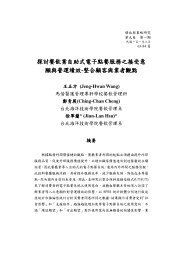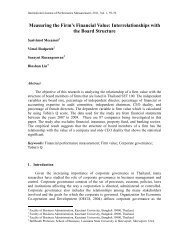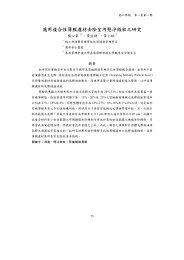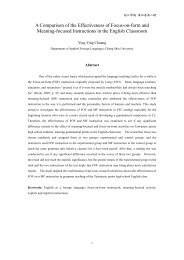ç®é - ç 究ç¼å±è - 稻æ±ç§ææ¨ç®¡çå¸é¢
ç®é - ç 究ç¼å±è - 稻æ±ç§ææ¨ç®¡çå¸é¢
ç®é - ç 究ç¼å±è - 稻æ±ç§ææ¨ç®¡çå¸é¢
You also want an ePaper? Increase the reach of your titles
YUMPU automatically turns print PDFs into web optimized ePapers that Google loves.
稻 江 學 報 第 五 卷 第 一 期<br />
Customer Satisfaction and Identity Theory are being used models of Sport<br />
Spectator Conative Loyalty :League Volleyball Tournament of 97<br />
Enterprises<br />
Po-jui Wu 1 Ming-Tsung Lee 2<br />
1 Department of Leisure Recreation & Travel Mangement,Toko University,Chyayi County<br />
2 Jhu-Tscun Primary School , Director<br />
Abstract<br />
Objective: This study was based on Trail, Anderson and Fink’s essay, which discussed the relationship of<br />
satisfaction, identity and loyalty of spectator. The researcher takes firsthand data to test and verify their dissertation.<br />
Method: The sample of this research was the spectator of the “league volleyball tournament of 97 enterprises” at .the<br />
southern part of Taiwan, sample method was random sampling. All of the questionnaires was 600, retrieve 512,<br />
effective rate was 74%. The resulting materials were tested by t-test , factor analysis, test of reliability and validity ,<br />
and path analysis. Result: Model A explained 74% of the variance in sport spectator conative loyalty; Model B<br />
explained 76% of the variance in sport spectator conative loyalty , and Model C explained 57% of the variance in<br />
sport spectator conative loyalty. The spectator’s satisfaction or (dis)confirmation of expectancies for event<br />
experience/outcome can influence their mood directly. Then the mood can effect their self-esteem responses. Finally,<br />
the identification with team and self-esteem responses would influence conative loyalty directly.<br />
Keyword: Satisfaction、Identity、Conative Loyalt<br />
144












